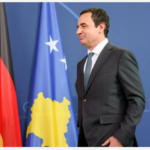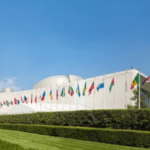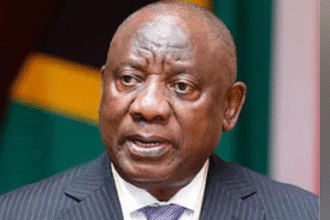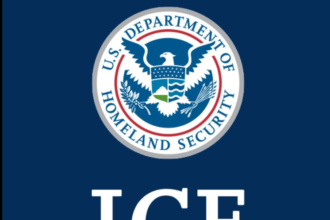Rwandan President Paul Kagame’s influential development-based leadership style gradually flows across Africa among young African leaders, including Guinea’s Col. Mamady Doumbouya, Mali’s military leader and President Assimi Goïta, and Burkina Faso’s military leader and Interim President Ibrahim Traoré.
Conakry, Guinea – Like Rwanda’s Paul Kagame who has and continues to convince a significant section of the African population, Guinea’s military leader and interim president Mamady Doumbouya is following similar path with his foresighted socio-economic development strategies.
Col. Doumbouya was the instigator of the September 5, 2021 Guinean coup d’état, in which the ex-president of Guinea, Alpha Condé, was detained.
Doumbouya and his military colleagues issued a broadcast on Guinea state television declaring that the army had dissolved the government and constitution, deposing veteran leader Alpha Conde.
He also said that the “National Committee of Reconciliation and Development (CNRD) was compelled to take its responsibility” after “the dire political situation of our country, the instrumentalization of the judiciary, the non-respect of democratic principles, the extreme politicization of public administration, as well as poverty and corruption.”
In an effort to justify the military’s actions, Doumbouya quoted the former Ghanaian president Jerry Rawlings, who said that “if the people are crushed by their elites, it is up to the army to give the people their freedom.”
On October 1, 2021, Col. Doumbouya was sworn in as interim president in Conakry. He announced plans to “reform the state” introducing “free, credible and “transparent” elections and respecting “all the national and international commitments to which the country has subscribed”. To date, return to civilian rule and multiparty elections timetable are mute, realistic and visible development agenda supersedes everything.
Since then, Col. Doumbouya has focused on national development at the expense of democratic reforms and the holding of “mere political elections”. He has since won the hearts and minds of millions of Guineans across the country, especially the youth population, despite a few and occasional pro-democracy protests here and there in the capital, Conakry.
The country’s infrastructure planning and implementation as well as rural development activities are in high gear and ongoing across all regions.
Today, the Guinean economy is one of the most resilient in West Africa. Driven by agriculture and mining, GDP grew an estimated 5.7% in 2023, up from 4% in 2022. Inflation fell from 10.5% in 2022 to 7.8% in 2023. The near stability of the exchange rate against the US dollar has offsets imported inflation.
The country’s budget deficit rose from 0.8% of GDP in 2022 to 1.6% in 2023, reflecting the impact of electricity and fuel subsidies, but remains one of the lowest in the economic Community of West African States (ECOWAS). The budget deficit was financed by bond issues. Public debt fell from 40.1% of GDP in 2022 to 35.2% in 2023.
Doumbouya focused on completing the Freetown-Conakry highway. The highway is a road corridor that connects the capital of Guinea, Conakry, with the capital of Sierra Leone, Freetown.
The EU funded the construction and rehabilitation of parts of the highway, including 85 km of road and the Magbele bridge. The Lungi-Port Loko road project also connected the Port Loko district to the Freetown-Conakry corridor.
Even though the driving distance between Sierra Leone to Guinea is 306 km, it takes approximately 4h21m to drive from Sierra Leone to Guinea.
Col. Doumbouya also prioritizes agriculture. Guinea enjoys sizeable endowments of natural resources, energy opportunities, and arable land. The agriculture sector is the country’s largest employer and plays a key role in poverty reduction and rural development, providing income for 57 percent of rural households, and employment for 52 percent of the labor force.
Guinea’s infrastructure can be embedded under two sub-sectors, each with many investment opportunities: urban and interurban infrastructure.

Transforming Conakry with the €60M Five Bridges project, enhancing urban access and economic growth, which will be completed by 2025 have become a hallmark of Doumbouya leadership.
The World Bank’s economic overview indicate the following for Guinea:
- After growing at 6.7% in 2023, driven by strong mining sector performance, growth is expected to moderate to 5.3% in 2024, partly due to the impact of the December 2023 fuel depot explosion and power outages on the non-mining sector.
- Inflation accelerated to an average of 8.5% during the first half of 2024, due to the temporary impacts of the December 2023 fuel depot explosion and the reduced electricity supply. However, after peaking at 9.3% year-on-year in January 2024, just after the explosion, inflation dropped to 8.1% in June 2024.
- Increased capital spending and higher interest payments, combined with slightly lower revenues due to the impact of the explosion on the non-mining sector, widen the fiscal deficit, estimated to reach 3.0% of GDP by end-2024.
- The increase in real GDP per capita, combined with a slowdown in food inflation, is expected to reduce the poverty rate (less than $3.65 per day, 2017 purchasing power parity) to 49.9% in 2024.
- Growth is projected to be sustained at an average of 6.2% in 2025-2026 driven mainly by investment.
- Downside risks include uncertainties in the timing of the political transition, which could slow reform implementation, and spillovers from conflicts elsewhere in the world, which could trigger a new wave of trade disruptions and inflation. On the upside, the start of the Simandou iron mine operations would boost exports and growth.
Supporters of Doumbouya’s efforts and Rwanda Paul Kagame’s success story say socio-economic development should trump the holding of mere “democratic” elections across Africa. This prompts the question and drives the debate in Africa: Development First, Democracy Later? Or Democracy First, Development Later?

Like Doumbouya, as more and more young African leaders follow Paul Kagame’s lead and development-oriented leadership, the question of multiparty democracy which generally translate in the holding of “free and fair” democratic election is becoming non-essential in the lives of many African communities that are robbed by daily their elected leaders.
Here is the big question: Should African countries prioritize development over western-style multiparty [the holding of mere presidential and legislative elections] democracy? Have your say.









